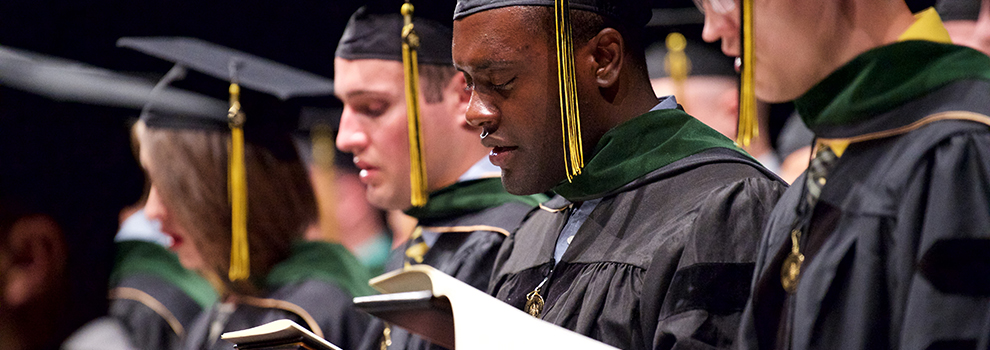Medical oaths are not all the same

Over the next few weeks, graduating medical students will recite their medical oath at commencement ceremonies across the country. Most people might assume that this oath is universal; even people within the medical profession, who know there is some variation, might think the oaths are essentially similar in terms of the values expressed. But a new study by a University of Iowa bioethicist and medical student finds that not only are there many different oaths, but only a few ethical values are held in common among these oaths.
Lauris Kaldjian, MD, PhD, professor of internal medicine and director of the Bioethics and Humanities Program at the UI Carver College of Medicine and lead study author, was surprised by the lack of common ground.
“I would have expected more values held in common, but the data we gathered showed that only five values are contained in the majority of oaths, and even those values are not unanimously expressed,” he says. “My biggest concern is that this lack of similarity could lead to misunderstanding and confusion. People might take this to mean that doctors can’t agree very broadly on what they think is most important in medicine.’”
Kaldjian notes that oaths are important not only because they are rituals that mark significant milestones in a physician’s career, but also because they are an expression of how physicians view their roles and responsibilities to their patients and to society.
“All of medicine depends on individual patients being willing to trust physicians and society at large being willing to trust the medical profession,” he says. “My way of thinking about these oaths is that they are supposed to be a tight summary of the commitments upon which this trust can be based.”
Wide variation among oaths
Kaldjian and Alexander Greiner, a student in the UI Medical Scientist Training Program, examined the content of 84 oaths available in 2015 from medical schools in the United States and Canada.
They found that only five ethical values were expressed in a majority of oaths –confidentiality, obligation to the profession, beneficence, avoiding discrimination, and honor and integrity. Notably, respect for patient autonomy, often considered a key factor in medical ethics, was not common, appearing in only nine oaths. The study was published in the journal Medical Education.
The variation among oaths stems from modifications of older oaths, most commonly the Oath of Hippocrates and the Declaration of Geneva, as well as the creation of new oaths. Moreover, this variability has been documented for many years.
The last major study detailing the variations was conducted more than a decade ago, so Kaldjian and Greiner set out to reexamine the content among medical oaths. The team was particularly interested in finding out if the Physician Charter on Medical Professionalism had influenced medical oaths.
The Physician Charter, which was published in 2002, represents a consensus-based effort between North American and European physicians to identify the ethical values that form the core of medical professionalism. Widely endorsed by the medical community, the charter is comprised of three basic principles and 10 commitments. The three principles cover the main principles of biomedical ethics: patient welfare, patient autonomy, and social justice. The 10 commitments cover other important ethical areas that many oaths don’t mention explicitly, such as conflict of interest.
Overall, the study suggests that uptake of the Charter’s values into new or modified oaths has been slow. Only three of the Charter’s principles and commitments – primacy of patient welfare, social justice, and confidentiality – were reflected in a majority of oaths.
The apparent lack of impact of the charter on medical oaths surprised the UI team.
“Even schools that had very recent modifications (to their oath), which we thought might have picked up some of the aspects of the charter, in fact had some of the least amount of content from the charter,” Greiner says.
Ethics in Medical Education
Kaldjian sees an opportunity to use the Physician Charter as a lens through which to look at medical oaths and determine which values are not represented in the oath and how they might be incorporated.
He hopes to use the study as a basis for a new elective offered to third- and fourth-year medical students focused on ethics and oaths that might ultimately involve a community-wide reexamination of the oath being used at the UI.
This fits with the current medical education practice at the UI Carver College of Medicine that integrates “ethics across the curriculum,” using the Physician Charter in lecture settings and also in clinical clerkships.
Kaldjian notes that the oath used at the UI did score relatively well in their study in terms of covering the type of content you would expect to have in an oath.
“I think that medical schools would do well to consider what constitutes ‘best practice’ when it comes to medical oaths,” Kaldjian says. “The more consensus we have on the core ethical values expressed in oaths, the more clarity there will be in communicating the professional standards that matter the most in the medical profession.”